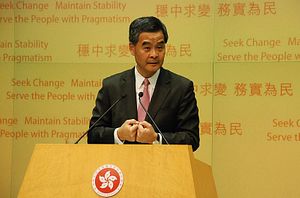Hong Kong’s anti-corruption watchdog, the Independent Commission Against Corruption, has raised eyebrows over its own ethics and independence since the removal of the acting Head of Operations Rebecca Li Bo-lan, a star investigator who trained with the United States Federal Bureau of Investigation (FBI).
Hong Kong news outlet Apple Daily said “the central government was not satisfied that the ICAC did not enthusiastically investigate and charge [suspects] in many cases,” and that Li had only lukewarm relationships with Chinese officials. It also said that the removal of Li was due to the Chinese government’s distrust in her due to her history with the FBI. But others have attributed the move to something much closer to home.
Democratic Party lawmaker Albert Ho Chun-yan questioned whether Li’s removal was associated with a case involving Chief Executive Leung Chun-ying and his alleged acceptance of a secret HK$50 million (US$6 million) deal from UGL, an Australian engineering firm. Ho said there was little progress in the UGL case, in which Li is a lead investigator, because neither the Chief Executive Office nor the Executive Council had responded to requests for information made by the ICAC close to a year ago. To make matters worse, Leung ignored a reporter’s question on whether the recent staff movements at the ICAC were related to Li’s role in the investigation into his case.
Earlier this week, another Democratic Party lawmaker, James To Kun-sun, said sources at the ICAC had told him that the agency had implemented internal guidelines that restrict investigators from using special powers in cases involving the chief executive, according the Hong Kong Free Press. The restrictions came after the amendment of the Prevention of Bribery Ordinance in 2008 to ban the application of the law to the chief executive. This claim has subsequently been rejected by the ICAC.
Lawmakers questioned Leung at the Legislative Council on Thursday, expressing their concern over his non-cooperation in the investigation into the secret payment and his role in Li’s removal. Leung refused to comment on the UGL case, saying he was legally prohibited from speaking about an ongoing investigation.
“Most of the arguments are speculation,” the chief executive said with regards to the ICAC, according to the South China Morning Post. “We shouldn’t publicly discuss appointment issues relating to the ICAC and government departments.” He again denied involvement in Li’s termination.
Simon Peh Yun-lu, ICAC Commissioner, said that he alone made the decision to remove Li, and nobody else, including the chief executive, had any role in the decision.
The Commission itself has received an internal backlash at the changes in operations management. Li subsequently resigned from the ICAC after being removed from her post. The principal investigator in the chief executive-UGL case, Dale Ko, has also tendered his resignation, though it is uncertain if his reasons are related to Li’s removal.
A scheduled ICAC annual dinner was cancelled after 75 percent of its staff said they would not attend the event in response the recent events.
The ICAC reports to the chief executive. The commissioner of the agency is nominated by the chief executive and appointed by the central government in Beijing. Li will be replaced by Ricky Yau Shu-chun starting July 18.

































